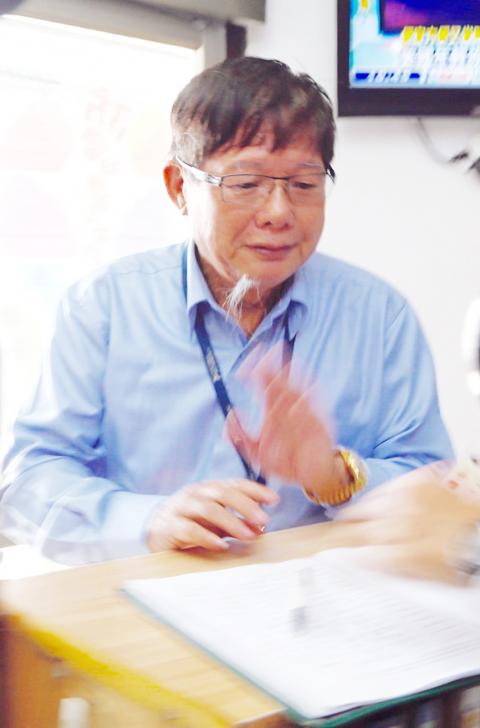Two government officials yesterday said they met Ching Fu Shipbuilding Co (慶富造船) president Chen Ching-nan (陳慶男) and his son, Chen Wei-chih (陳偉志), last year, but they did not press the navy to expedite a payment of NT$2.4 billion (US$79.58 million at the current exchange rate) for a minesweeper project.
The visit by Chen Ching-nan and Chen Wei-chih to then-New Southbound Policy Office director James Huang (黃志芳) and Presidential Office Third Bureau Director David Lee (李南陽) at the Presidential Office on Sept. 23 last year was the last of six visits the two made to the office since 2010.
The first five meetings occurred during former president Ma Ying-jeou’s (馬英九) administration, including a meeting on Dec. 9, 2015, between Chen Ching-nan and then-Presidential Office deputy secretary-general Hsiung Kuang-hua (熊光華).

Photo: CNA
The other four visits were made when the office was receiving foreign dignitaries, records showed.
Chen Ching-nan was involved in all but one of the the six visits, while Chen Wei-chih took part in the first and the last.
The records were published by the Presidential Office on Wednesday night, contradicting its earlier claims it had found no evidence of a visit last year.
Presidential Office spokesman Sidney Lin (林鶴明) on Wednesday said that Chen Ching-nan and his son did not meet with any official from either President Tsai Ing-wen’s (蔡英文) office or that of the National Security Council secretary-general.
The pair met with Huang and Lee in their respective offices and left the Presidential Office Building after 1 hour and 48 minutes, Lin said.
Lee said the minesweeper project was not raised during the meeting, adding that a full report on the meeting had been compiled and forwarded to the Presidential Office.
Lee said that he had asked his secretary to contact Huang’s office after hearing that Chen Ching-nan also planned to visit Huang.
Huang said he handed his visitor logs to the Presidential Office Division of Governmental Ethics on Wednesday afternoon.
Huang said his meeting with Chen Ching-nan had primarily been about cooperation with Indonesian shipbuilders and land developers on Kabupaten Pulau Morotai Island in Indonesia.
“He [Chen Ching-nan] brought up the minesweeper project toward the very end of the meeting, but I thought has was simply complaining,” Huang said.
“I am willing to take full responsibility” if it could be proven that he had contacted the Ministry of National Defense and the Presidential Office as a result of the meeting, Huang said.
Huang said he had not relayed Chen Ching-nan’s complaints to his superiors as it was “not his job.”
Meanwhile, the Democratic Progressive Party (DPP) called on Ma to clarify the details of the meetings with Chen Ching-nan during his presidency.
DPP caucus secretary-general Ho Hsin-chun (何欣純) said that on the same day Chen Ching-nan accepted then-vice president Wu Den-yih’s (吳敦義) invitation to appear at a state banquet for Guatemala on Dec 29, 2015, then-Executive Yuan secretary-general Chien Tai-lang (簡太郎) called for a second round of mediation talks with the company’s creditor banks.
Wu should clarify what happened at the meeting and why the banks, which had refused to provide Ching Fu with a loan, later agreed to the loan, Ho said.
Additional reporting by Peng Wan-hsin

A Ministry of Foreign Affairs official yesterday said that a delegation that visited China for an APEC meeting did not receive any kind of treatment that downgraded Taiwan’s sovereignty. Department of International Organizations Director-General Jonathan Sun (孫儉元) said that he and a group of ministry officials visited Shenzhen, China, to attend the APEC Informal Senior Officials’ Meeting last month. The trip went “smoothly and safely” for all Taiwanese delegates, as the Chinese side arranged the trip in accordance with long-standing practices, Sun said at the ministry’s weekly briefing. The Taiwanese group did not encounter any political suppression, he said. Sun made the remarks when

PREPAREDNESS: Given the difficulty of importing ammunition during wartime, the Ministry of National Defense said it would prioritize ‘coproduction’ partnerships A newly formed unit of the Marine Corps tasked with land-based security operations has recently replaced its aging, domestically produced rifles with more advanced, US-made M4A1 rifles, a source said yesterday. The unnamed source familiar with the matter said the First Security Battalion of the Marine Corps’ Air Defense and Base Guard Group has replaced its older T65K2 rifles, which have been in service since the late 1980s, with the newly received M4A1s. The source did not say exactly when the upgrade took place or how many M4A1s were issued to the battalion. The confirmation came after Chinese-language media reported

The Taiwanese passport ranked 33rd in a global listing of passports by convenience this month, rising three places from last month’s ranking, but matching its position in January last year. The Henley Passport Index, an international ranking of passports by the number of designations its holder can travel to without a visa, showed that the Taiwan passport enables holders to travel to 139 countries and territories without a visa. Singapore’s passport was ranked the most powerful with visa-free access to 192 destinations out of 227, according to the index published on Tuesday by UK-based migration investment consultancy firm Henley and Partners. Japan’s and

BROAD AGREEMENT: The two are nearing a trade deal to reduce Taiwan’s tariff to 15% and a commitment for TSMC to build five more fabs, a ‘New York Times’ report said Taiwan and the US have reached a broad consensus on a trade deal, the Executive Yuan’s Office of Trade Negotiations said yesterday, after a report said that Washington is set to reduce Taiwan’s tariff rate to 15 percent. The New York Times on Monday reported that the two nations are nearing a trade deal to reduce Taiwan’s tariff rate to 15 percent and commit Taiwan Semiconductor Manufacturing Co (TSMC, 台積電) to building at least five more facilities in the US. “The agreement, which has been under negotiation for months, is being legally scrubbed and could be announced this month,” the paper said,